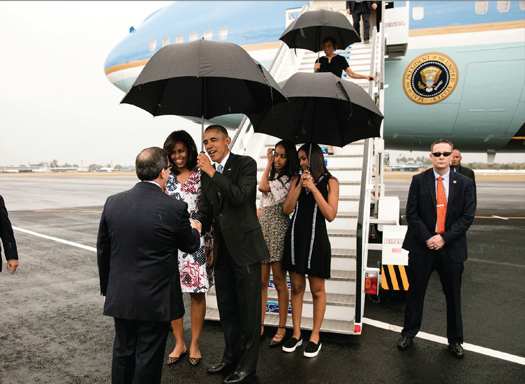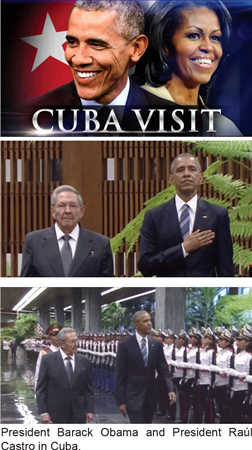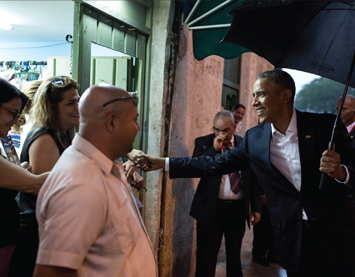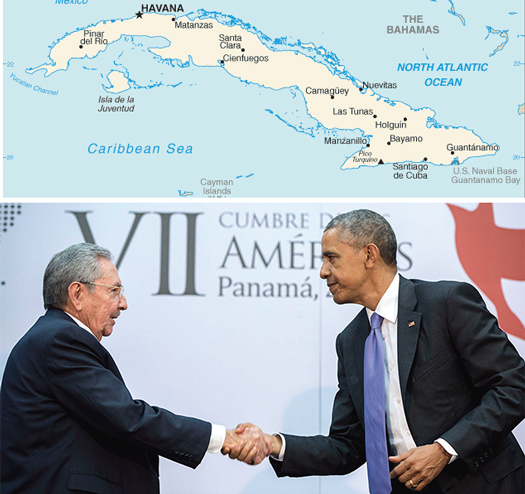Obama’s Historic Cuba Visit Brings Accolades And Concern
By Brian E. Muhammad -Contributing Writer- | Last updated: Mar 23, 2016 - 1:31:19 PMWhat's your opinion on this article?

President Barack Obama, First Lady Michelle Obama, daughters Malia and Sasha greets dignitaries Upon arrival in Havana, Cuba, March 20, 2016. Photos: Official White House Phot/Pete Souza
|
President Barrack Obama, the first family along with several congressmen and business people landed in Havana, Cuba for a two-day official visit where he met with Cuban President Raul Castro, was scheduled to speak to the Cuban people and hold audiences with political dissidents and the opposition.

|
“Que bolá Cuba,” President Obama shared via Twitter.
“Just touched down here, looking forward to meeting and hearing directly from the Cuban people,” he wrote in a single sentence message on Twitter March 20 just before disembarking from Air Force One.
The American-Cuban rapprochement was jointly announced by President Obama and President Castro December 17, 2014. The trip comes in the closing year of the Obama presidency and has been described as an effort to shore up cultural links, education and trade and commerce opportunities with American businesses to benefit the Cuban people.
But notwithstanding the careful messaging and soft power diplomacy emphasizing concern for the “Cuban people” and “human rights,” some observers advise caution in dealing with the United States.
Cuba, U.S. and Trust issues
For much of Latin America the U.S. represents an empire and strength that historically upheld a few oligarchs at the expense of an exploited majority. Looking at the significance of the visit during an interview with the Guardian newspaper, Camilo Guevara—the son of the late revolutionary icon Che Guevara who fought alongside the Cubans during the revolution—described it as historic and important.
“But the U.S. is an empire,” Mr. Guevara said. “Their nature is not to set the table and invite you for a feast. History shows us that every time they set a table, you have to accept you might be poisoned or stabbed in the back. But let’s see,” he advised.

President Barack Obama greets people in Old Havana, Cuba, March 20, 2016.
|
Presidents Obama and Castro held a joint press conference March 21 that laid out several outstanding issues interfering with full normalization. President Castro called on fully lifting the economic blockade and the return of its territory at Guantanamo Bay. “In order to move forward towards normalization it will also be necessary to return the territory illegally occupied by Guantanamo Naval Base,” said President Castro. He also raised the issues of regional peace and stability such as continued U.S. interference in Venezuelan internal affairs. “I had planned to raise our concern over the destabilization some are trying to promote in Venezuela,” he said.
There are “profound differences between our countries that will not go away,” President Castro said. He pointed out that the U.S. and Cuba have fundamental differences about political systems, democracy, the exercise of human rights, social justice, international relations, world peace and stability.
“In our view, civil, political, economic, social and cultural rights are indivisible, interdependent and universal,” he explained.
Cuba’s president highlighted some of the successful cooperative efforts undertaken by the two countries, including those in the areas of telecommunications, health care, and the environment, as well as the joint work carried out combating the Ebola and Zika viruses. In reference to steps Mr. Obama has taken to modify aspects of the U.S. blockade, President Castro described these as “positive but insufficient,” emphasizing that the policy remains in force and has “intimidating and extraterritorial” effects.
U.S. befriending Cuban opposition?
The fact that the president is planning to meet with dissenters poses this question: Is it a repeat of Panama … Libya … a repeat of Syria?” asked Tony Muhammad, a Miami-based activist, organizer and school teacher who is of Cuban descent.

President Barack Obama shakes hands with President Raúl Castro of Cuba during the Summit of the Americas at the Atlapa Convention Center in Panama City, Panama, April 11, 2015. Photo: Official White House Photo/Pete Souza
|
“On the surface it may appear the intentions are good,” Mr. Muhammad told The Final Call.
“It has been President Barack Obama that has been the first U.S. president to open up dialogue with Cuba in 54 years about lifting the economic embargo and actually establishing trade,” he remarked. But sitting down with dissenters without any regard to what the Cuban government thinks “may show the actual intentions of the United States in its plans in Cuba which is nothing new,” Mr. Muhammad added. “It’s the same basic politics … it has engaged with the region for well over a century.”
The economic, commercial and financial blockade imposed on Cuba by the U.S. over 50 years is the main hindrance to normalizing relations. In the days leading up to the visit the U.S. Dept. of Treasury and Commerce announced new regulations that amend aspects of the sanctions against Cuba. The March 15 announcement includes the use of the U.S. dollar in Cuban transactions and the relaxation of travel restrictions of American citizens visiting the island. United Airlines will begin direct flights to Havana. According to the White House website, “authorized American travelers” to Cuba is up 54 percent since 2014.
“The truth is that the blockade is still in force,” said Cuban Foreign Minster Bruno Rodriquez Parrilla in a statement days before President Obama’s arrival. Mr. Rodriquez questioned the U.S. claim of operating in the best interests of the Cuban people when the embargo is the main obstacle to Cuba’s economic development. “They cause hardships to the Cuban people,” and should be lifted altogether, he said.
“We recognize the position adopted by President Obama against the blockade and his repeated appeals to Congress urging it to lift it,” Mr. Rodriquez said.
President Obama said the mixture and size of the members of Congress in his delegation is a sign that there is serious interest among U.S. lawmakers to end the embargo. But much of that happening depends on the “human rights” concerns and progress within Cuba, he said.
During questions from the press on human rights issues, President Castro said there are 61 international instruments on human rights and no country in the world complies with all; some more and some less than others. However “human rights should not be politicized,” he argued.
U.S. failed policy drove change?
President Obama is the first American head of state to visit Cuba since an official trip by President Calvin Coolidge in 1928. Geopolitical reasons underscoring the new relationship are not going unnoticed. In announcing the trip which includes a state visit to Argentina, White House Deputy National Security Advisor for Strategic Communications and Speechwriting Ben Rhodes admitted it was U.S. failed policy over five decades that drove the change in relations.
“For more than 50 years, the United States pursued a policy of isolating and pressuring Cuba,” Mr. Rhodes wrote in a WhiteHouse.Gov explanation on why the president is doing the trip.
“While the policy was rooted in the context of the Cold War, our efforts continued long after the rest of the world had changed. “Put simply, U.S. Cuba policy wasn’t working and was well beyond its expiration date,” he said.
“The United States was isolated within our own hemisphere — and in the wider world — which disagreed with our approach. Most importantly, our policy was not making life better for the Cuban people — and in many ways, it was making it worse,” admitted Mr. Rhodes.
American imperialism and sustained aggression and sanctions on the small island nation 90 miles from the coast of Florida were a failure. The Cuban political system had not changed and over 600 plots and attempts by the U.S. Central Intelligence Agency to eliminate Cuban leader Fidel Castro since 1959 has failed, added critics of U.S. Cuba policy. He turns 90 years old in August and has survived half the U.S. presidents who attempted his demise.
So far at Final Call press time, President Obama had been well received and was well liked on the streets of Cuba. But some observers like Mr. Guevara warn that although the president appears “intelligent and sensitive towards the major problems of humanity,” he came to power in an election supported by corporate America, not a revolution. “The color of skin is one thing; the color of ideology is another,” said Mr. Guevara.
INSIDE STORIES AND REVIEWS
-
-
About Harriett ... and the Negro Hollywood Road Show
By Rabiah Muhammad, Guest Columnist » Full Story -
Skepticism greets Jay-Z, NFL talk of inspiring change
By Bryan 18X Crawford and Richard B. Muhammad The Final Call Newspaper @TheFinalCall » Full Story -
The painful problem of Black girls and suicide
By Charlene Muhammad -National Correspondent- » Full Story -
Exploitation of Innocence - Report: Perceptions, policies hurting Black girls
By Charlene Muhammad -National Correspondent- » Full Story -
Big Ballin: Big ideas fuel a father’s Big Baller Brand and brash business sense
By Bryan Crawford -Contributing Writer- » Full Story






 Click Here Stay Connected!
Click Here Stay Connected!








